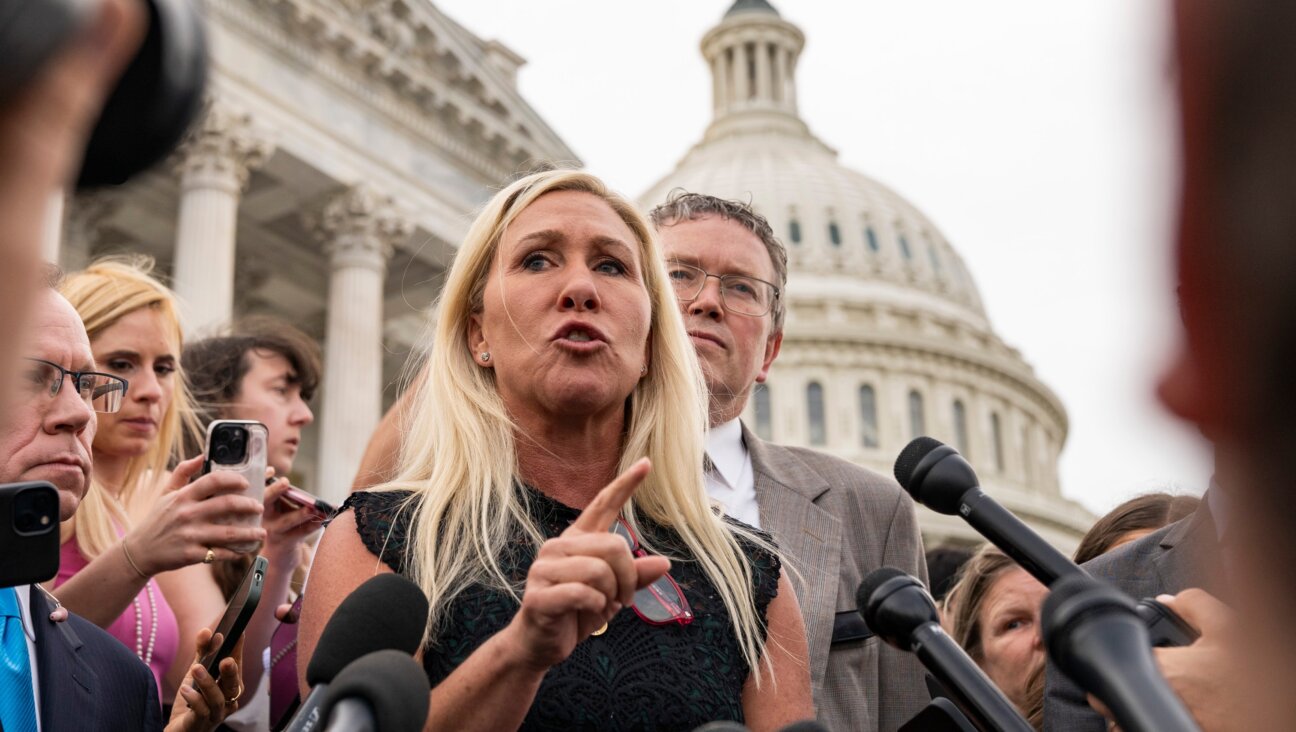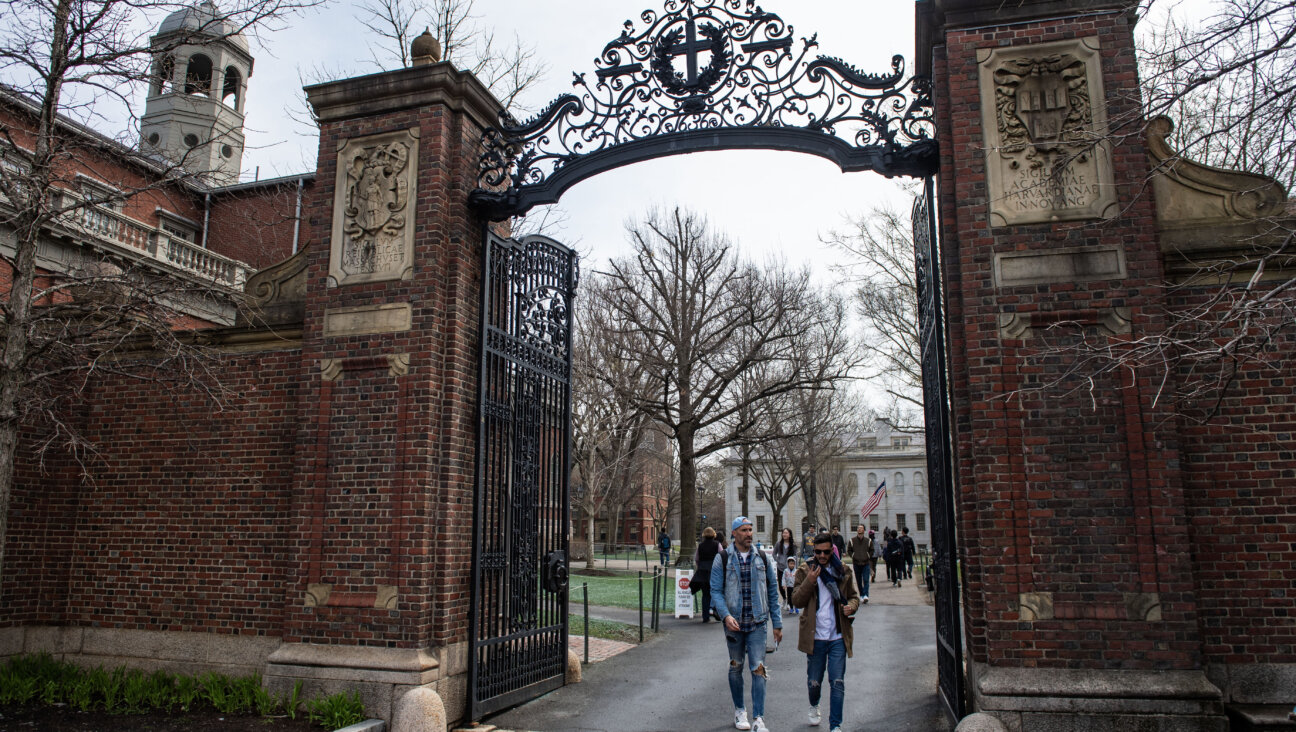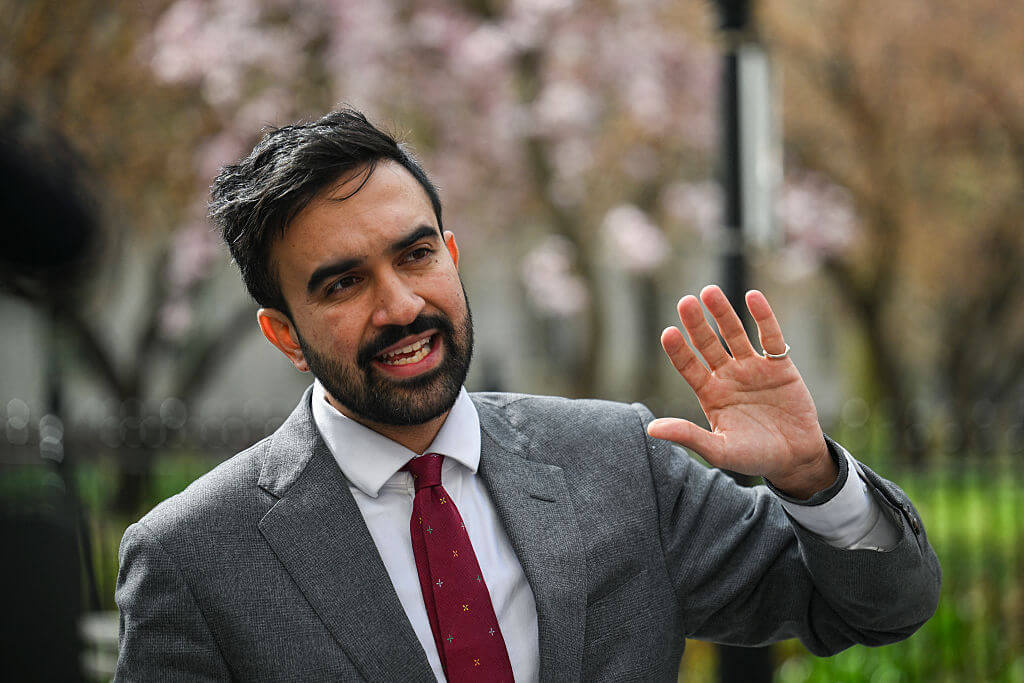Senate Probe Of Lobbying Puts Heat On DeLay Ally
As congressional Republicans scrambled to shield House Majority Leader Tom DeLay from the fallout of a possible indictment, a Senate investigation zeroed in on the lobbying activities of one of his top allies in the Jewish community.
Republican lobbyist Jack Abramoff, a DeLay ally and a major philanthropic supporter of Orthodox causes in the Washington, D.C., area, is being investigated by the Senate Indian Affairs Committee and a federal grand jury. At issue is alleged overcharging in more than $60 million in lobbying fees that he and an associate collected from several Indian tribes, including the Tigua of Texas.
Abramoff, the founder and virtually the sole supporter of the now-defunct Eshkol Academy, an Orthodox day school for boys in Columbia, Md., came under intense scrutiny at a Senate hearing last week. In the latest twist, according to documents released by Senate investigators, Abramoff asked Tigua leaders to allow the Eshkol school to take out term life insurance policies on tribal elders aged 75 and up, as a way “to obtain lobbying funds” for his law firm, Greenberg Traurig.
The tribe did not sign on to the idea. Even so, the plan infuriated Senator Ben Nighthorse Campbell, a Colorado Republican and outgoing chairman of the Indian Affairs Committee, who castigated Abramoff during a committee hearing on Capitol Hill November 17.
“In effect, Abramoff asked to be paid by putting a price on the lives of the tribal elders,” Campbell said, adding that while “we’ve witnessed a lot of unseemly, unethical and vulgar things” in the course of the investigation, the insurance scheme was “the most distasteful thing we’ve seen yet.”
Abramoff’s representatives insist that he has done nothing wrong.
Last week’s Senate hearing came as House Republicans were working successfully to change a party rule that would have forced DeLay to step down as majority leader if indicted on a felony charge. The controversial move was made in anticipation of a possible indictment by a state grand jury in Texas, investigating illegal campaign fund-raising activities. Three DeLay associates already have been charged, but CBS News quoted a source involved in the investigation as saying that DeLay was unlikely to be indicted.
While Washington insiders seem certain that DeLay would not be affected adversely by the controversy involving his associates, Abramoff’s clout on Capitol Hill is believed to be diminishing rapidly.
Before his legal troubles began, Abramoff was one of the chief pillars of the budding political alliance between Orthodox Jews and Evangelical Christians. He is a hard-charging, hard-right veteran of Republican politics who has built a reputation and fortune as a top lobbyist, in part by leveraging relationships with GOP congressional leaders, including DeLay.
In the Jewish community, Abramoff promoted a conservative Republicanism based on a strong association with evangelical Christian politicians such as DeLay, who hold strongly pro-settler views on Israel. According to press reports, Abramoff was introduced to DeLay by Rabbi Daniel Lapin, the Orthodox Jewish founder of Toward Tradition, a group that seeks to bring Jews and Christians together to support traditional conservative values. Abramoff is a former chairman of the organization.
Lapin and a DeLay spokeswoman did not return calls seeking comment.
Of his relationship with DeLay, Abramoff once told the Washington Business Forward: “He’s a religious Christian, I’m a religious Jew.”
“He’s very actively pro-Israel. I’m rabidly pro-Israel,” Abramoff said. “We had a lot of mutual friends, as well.”
The relationship burgeoned and provided many benefits to Jewish institutions.
“Anyone connected to Jewish life in Washington knows that if you want contact and strength coming from DeLay’s office, one of the persons who can make that happen is Abramoff, who hired many former DeLay staff members,” said University of Richmond political science professor Akiba Covitz, who knows Abramoff.
“I don’t think Jack was enriching himself in any of this,” Covitz added about the Indian scandals. “Why he pushed himself was to make a difference in the lives of many people in the Jewish community…. Nearly everything he had was going into paying for a Jewish educational institution and other Jewish institutions in the Washington area.”
In e-mail messages quoted in an article in The Washington Post, Abramoff described the Eshkol school as “our front group” and as “our conduit for some of activities” related to tribal lobbying. When Abramoff was reminded by an associate that the proposed insurance payments to Eshkol Academy could not be used for lobbying, he wrote the tribe that “the school will use other funds of the school to pay for that.”
Abramoff has since left Greenberg Traurig. His spokesman, Peter Mirijanian, said there was nothing wrong with the insurance idea.
“Mr. Abramoff’s law firm, like many others in the country, advised clients that they could help charitable and non-profit organizations through the proceeds of life insurance policies,” Mirijanian said in a statement. “Whether these were for Native American causes or other charities, neither the firm nor Mr. Abramoff received a dime from this method of fund raising. To single him or his law firm out for a fund raising technique that is routinely offered across the country is just another example of critics using the present controversy to unfairly attack Mr. Abramoff with baseless insinuations of wrongdoing.”
Jill Perry, director of marketing and communications for Greenberg Traurig, responded in a statement, “The firm does not condone any of Mr. Abramoff’s actions. The activities of Mr. Abramoff as described at the Senate hearing regarding the Tigua tribe are unacceptable to the firm and antithetical to the way we do business.”
The situation of Eshkol, which opened in 2002 and folded last May as the Senate probe gathered steam, is turning out to be a sore point in the Maryland Jewish community. Thirteen former Eshkol teachers are suing Abramoff, Abramoff’s wife, Pam, the school and the Capital Athletic Foundation, an Abramoff-controlled charity, for about $150,000 in wages that they say were not paid when the school folded, along with statutory and punitive damages and lawyers’ fees. A judge recently issued a temporary restraining order freezing Abramoff’s assets, but in a setback for the teachers, that order was lifted November 19.
The teacher’s complaint claims that the Capital Athletic Foundation “was used to launder funds from the tribes to Eshkol.” Federal tax records show that various tribes donated more than $1 million to the foundation, which in turn benefited the school.
Mirijanian defended Abramoff’s charitable causes: “Capital Athletic Foundation and Eshkol Academy were real and properly run charitable institutions that supported real programs that made a real difference in the lives of children in our community.”
The teachers don’t care.
“We just want [our] contracts to be honored,” Robert Whitehill, an Eshkol Hebrew teacher who is a plaintiff in the suit, told the Forward. “We would love to settle. We have limited funds.” He said the scandal over Abramoff’s lobbying fees and the funding of the school “puts the Jewish community in a very bad light.”
James Rubin, an attorney for the teachers, said, “This is a suit by a group of former teachers who were making $30,000 to $60,000 a year. It’s ironic the vigor [with which] he’s defending this given the public reporting of the millions he’s received from the tribes.”
Abramoff’s attorney, Abbe Lowell of Chadbourne & Parke, said in a statement that “the teachers who got most of their salaries have no basis to sue the Abramoffs, who did nothing but support that school for as long as they could. Just as their temporary restraining order was misplaced, so will prove to be their entire lawsuit.”
The Forward is free to read, but it isn’t free to produce

I hope you appreciated this article. Before you go, I’d like to ask you to please support the Forward.
Now more than ever, American Jews need independent news they can trust, with reporting driven by truth, not ideology. We serve you, not any ideological agenda.
At a time when other newsrooms are closing or cutting back, the Forward has removed its paywall and invested additional resources to report on the ground from Israel and around the U.S. on the impact of the war, rising antisemitism and polarized discourse.
This is a great time to support independent Jewish journalism you rely on. Make a gift today!
— Rachel Fishman Feddersen, Publisher and CEO
Support our mission to tell the Jewish story fully and fairly.
Most Popular
- 1

Fast Forward Why the Antisemitism Awareness Act now has a religious liberty clause to protect ‘Jews killed Jesus’ statements
- 2

Culture Trump wants to honor Hannah Arendt in a ‘Garden of American Heroes.’ Is this a joke?
- 3

Fast Forward The invitation said, ‘No Jews.’ The response from campus officials, at least, was real.
- 4

Opinion A Holocaust perpetrator was just celebrated on US soil. I think I know why no one objected.
In Case You Missed It
-

Opinion The secret cost of Israel’s wars ravaged my family. It’s only getting worse
-

Yiddish מחשבֿות פֿון אַן אַהיים־געקומענעם (אַ מלחמה־טאָגבוך)Reflections of a soldier after returning home (a wartime diary)
דער מחבר איז אַ סטודענט אינעם ירושלימער העברעיִשן אוניווערסיטעט, אינעם צווייטן יאָר ייִדיש־לימוד
-

Fast Forward Why the Antisemitism Awareness Act now has a religious liberty clause to protect ‘Jews killed Jesus’ statements
-

News At Harvard, reports on antisemitism and anti-Palestinian bias reflect campus conflict over Israel
-
Shop the Forward Store
100% of profits support our journalism
Republish This Story
Please read before republishing
We’re happy to make this story available to republish for free, unless it originated with JTA, Haaretz or another publication (as indicated on the article) and as long as you follow our guidelines.
You must comply with the following:
- Credit the Forward
- Retain our pixel
- Preserve our canonical link in Google search
- Add a noindex tag in Google search
See our full guidelines for more information, and this guide for detail about canonical URLs.
To republish, copy the HTML by clicking on the yellow button to the right; it includes our tracking pixel, all paragraph styles and hyperlinks, the author byline and credit to the Forward. It does not include images; to avoid copyright violations, you must add them manually, following our guidelines. Please email us at [email protected], subject line “republish,” with any questions or to let us know what stories you’re picking up.














